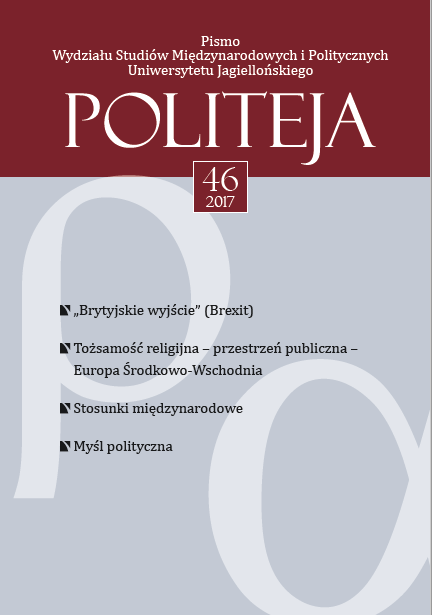Uczenie się pluralizmu i kształtowanie tożsamości religijnej w kontekście kulturowych i światopoglądowych odmienności – między tradycyjnym zróżnicowaniem a współczesnym pluralizmem
Learning pluralism and shaping religious identity in the context of cultural and ideological differences – between traditional diversification and contemporary pluralism
Author(s): Marek RembierzSubject(s): Christian Theology and Religion, Politics, Sociology
Published by: KSIĘGARNIA AKADEMICKA Sp. z o.o.
Keywords: pluralism; learning pluralism; religion; identity; education;
Summary/Abstract: In the public and academic discourse, pluralism is recognized as one of the main features of the contemporary Western world, which is culturally, religiously and ideologically diversified. According to its supporters and promotors, pluralism is a significant value which constitutes a virtue of the modern world. However, pluralism is also associated with various problems, dilemmas and difficulties. Contemporary cultural pluralism has a substantial impact on shaping the religious identity and causes significant changes within it. In the 1970s and 1980s, sociologists indicated some pluralization processes which modified religious identity. In 1983, while examining the determinants of the Church activities in the industrial society, Janusz Mariański – a sociologist of religion, agreed with the observation that “what is eliminated in the pluralistic society is the situation of the monopoly of church institutions in interpreting human reality in the consciousness of the contemporary man. Religious values are not the only which give sense to fundamental values institutionalized in the society”. Thus, religion ceases to have the earlier potentialities of the monopoly in the sphere of fundamental values. The issue of pluralism, widely discussed today and raising a lot of dispute, can be viewed from the perspective of the analysis of broadly understood learning processes and outcomes (the analysis of educational and self‑ educational activities). Pluralism can be perceived as a process and a result of mutual and constant learning in the (educationally potent and dynamic) relationship with individuals who show more or less different attitudes and beliefs – a process of learning those who, by entering relationships with each other, preserve and at the same time shape their different identities. If a person enhances the inner will to learn constantly, to multiply the cognitively valuable knowledge, to improve intellectual skills, this willingness should lead to the recognition of important intrinsic and educational values of other attitudes and beliefs. By meeting what is to some extent different, it is possible to learn further and, with growing accuracy, to recognize the fields of one’s own ignorance. Modern pluralism poses serious challenges to religion. The statement used in sociological discourse that “pluralistic tendencies are destructive to religion” can be read by those for whom religion – confessing religious faith – is close and important as a challenge to oppose pluralism for the sake of the defense of traditionally perceived religious faith, the defense of its world view and its institution. Such a deeply engaged interpretation imposes formulating an alternative: either the pluralistic tendencies which are destructive to religion get intensified or religion gets more power, counteracting the dangerous tendencies of pluralism which pose threat to religion. Two different ways of the inner diagnosis of religion are outlined here. The first is a fundamentalist one and consists in “strengthening its own positions”, as it recognizes that the overemphasized (in religion) elements of openness and dialogue weaken religion from inside, making it more sensitive to destructive influence of pluralism (openness and dialogue are a “Trojan horse” of hostile pluralism, let into the inside of religion). The second way, of the in‑depth and self‑critical reflection upon the current situation of religion, may lead to recognizing (among the elements so far belonging to religious identity) those which – in the context of pluralism and in spite of their presence for many centuries – are of doubtful value or even become the causes of the destructive crisis of religion in spite of their being situated inside it. Therefore, the situation of pluralism allows for cleaning religion, which is confronted with pluralism and was earlier closed within its homogeneous world. At the same time, the religious crisis in the pluralistic world can be viewed as a crisis of inner maturation and growth of religion. Undertaking ideological discussion with the conviction that common and binding arrangements should be reached is not an easy matter. What is more, in the opinion of people who believe in the necessity of confrontation, this discussion is not even needed. It can be assumed that, in the diversified social life, the persistent conducting of difficult negotiations is indispensable, instead of the state of embittered confrontation. Referring to the standpoint of Jerzy Nikitorowicz, who promotes learning pluralism and intercultural dialogue, the dialogical concept of pluralism can be applied: “In the pluralistic society, the process is taking place of reaching commonly shared values by individuals and groups through unceasing negotiations of values and interests, the process of shaping the sensitivity to others and the need for mutual respect and recognition, without the division to upper and lower cultures”.
Journal: Politeja - Pismo Wydziału Studiów Międzynarodowych i Politycznych Uniwersytetu Jagiellońskiego
- Issue Year: 14/2017
- Issue No: 46
- Page Range: 191-237
- Page Count: 47
- Language: Polish

